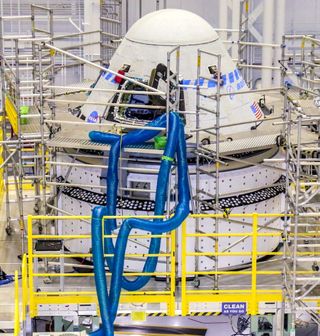Boeing, NASA target July 30 for 2nd test flight of Starliner capsule
Starliner will try again to reach the space station.

Boeing's Starliner astronaut taxi will launch on its second test flight in July, if all goes according to plan.
The company now aims to launch Starliner no sooner than July 30 — slightly earlier than the previously announced target of early August. The upcoming liftoff will kick off Orbital Flight Test-2 (OFT-2), an uncrewed mission to the International Space Station.
Boeing last tried such a test flight in December 2019, but the spacecraft did not reach the station as planned due to a series of technical problems. Further delays ensued as Boeing attempted to meet NASA requirements stemming from a postflight review, and technical and weather issues contributed as well. Boeing has also had to wait while NASA tried to find an available slot in the busy launch schedule for ISS-bound spaceships, both crewed and uncrewed.
Related: Boeing's 1st Starliner lands in New Mexico after shortened test flight
In a press release, Boeing outlined its progress as it prepares for OFT-2.
"Boeing recently completed end-to-end testing of Starliner's flight software by flying a five-day simulated OFT-2 mission with operations teams and the highest-fidelity hardware," the company said.
"Boeing will continue supporting NASA's post-test reviews, and has submitted all OFT-2 verification and validation paperwork," Boeing continued. "All actions recommended by the Boeing/NASA Joint Independent Review Team as a result of Starliner's first test flight are complete and pending closure."
Get the Space.com Newsletter
Breaking space news, the latest updates on rocket launches, skywatching events and more!
Both Boeing and SpaceX hold commercial-crew contracts with NASA. SpaceX has now launched two operational crewed missions to the ISS for the agency with its Crew Dragon capsule and Falcon 9 rocket, but astronauts have yet to climb aboard Starliner. Success on OFT-2 will help pave the way for crewed missions with the Boeing capsule, which Ars Technica reported will likely begin in 2022.
NASA elected to take the commercial crew route to fill the shoes of its space shuttle fleet, which retired in 2011 after 30 years of orbital operations. Development of commercial crew stretches back through several presidential administrations; after several rounds of earlier competitive evaluations, SpaceX and Boeing were ultimately selected in 2014 to split a $6.8 billion Commercial Crew Transportation Capability award.
Before Crew Dragon came online, Russia's Soyuz spacecraft was the only crew-carrying orbital vehicle available in the wake of the shuttles' retirement. NASA has had to procure some Soyuz seats in 2021 to maintain its staffing requirements on ISS.
Follow Elizabeth Howell on Twitter @howellspace. Follow us on Twitter @Spacedotcom and on Facebook.
Join our Space Forums to keep talking space on the latest missions, night sky and more! And if you have a news tip, correction or comment, let us know at: community@space.com.

Elizabeth Howell (she/her), Ph.D., is a staff writer in the spaceflight channel since 2022 covering diversity, education and gaming as well. She was contributing writer for Space.com for 10 years before joining full-time. Elizabeth's reporting includes multiple exclusives with the White House and Office of the Vice-President of the United States, an exclusive conversation with aspiring space tourist (and NSYNC bassist) Lance Bass, speaking several times with the International Space Station, witnessing five human spaceflight launches on two continents, flying parabolic, working inside a spacesuit, and participating in a simulated Mars mission. Her latest book, "Why Am I Taller?", is co-written with astronaut Dave Williams. Elizabeth holds a Ph.D. and M.Sc. in Space Studies from the University of North Dakota, a Bachelor of Journalism from Canada's Carleton University and a Bachelor of History from Canada's Athabasca University. Elizabeth is also a post-secondary instructor in communications and science at several institutions since 2015; her experience includes developing and teaching an astronomy course at Canada's Algonquin College (with Indigenous content as well) to more than 1,000 students since 2020. Elizabeth first got interested in space after watching the movie Apollo 13 in 1996, and still wants to be an astronaut someday. Mastodon: https://qoto.org/@howellspace
